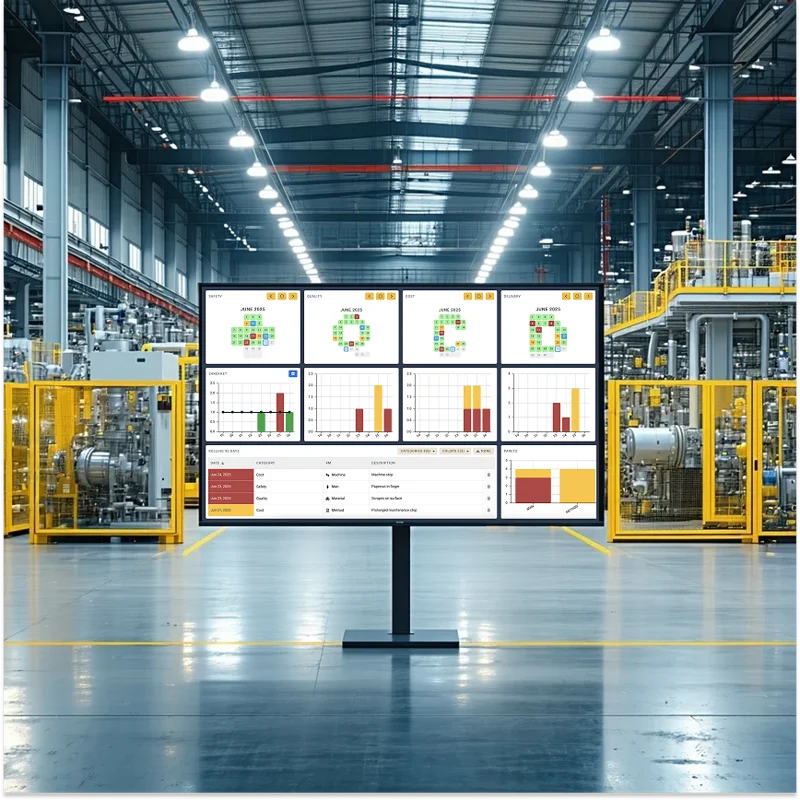

Recently, the National Association of Manufacturers (NAM) released the report Manufacturing Trends 2025. Here are the key insights:
Incorporating Smart Factories and Digital Transformation Strategies
A survey by the Manufacturing Leadership Council in 2024 showed that 40% of leaders in manufacturing aim for greater customer satisfaction and cost reductions by embracing a smart factory strategy. In the same survey, called the “Smart Factories and Digital Production Survey,” 50% of respondents stated that they are planning to leverage new tech like AI, IIoT, and machine learning in their factories by 2026.
By leveraging smarter tech and data-driven manufacturing, companies will improve their responsiveness to market and customer needs. By utilizing new technology, manufacturers will also achieve shorter time to market, higher efficiency, reduced costs, and improved earnings. To reap the benefits, manufacturers need to rely on a digital transformation roadmap and stay updated on best practices in current data and technology. An agile structure will be the most important factor for both long- and short-term success.
Assets and further reading
Future of Manufacturing Project: A way for manufacturers to understand the key trends unfolding today that will help them realize a better future.
What effect can our clients expect: Read more about how Mevisio digitally transforms manufacturing operations.
Positioning Sustainability Efforts as a Differentiator
A lot of change is affecting manufacturers in 2025—customer demands, changing regulations, and issues connected to environmental, social, and governance (ESG) factors. The cost difference between being proactive or reactive regarding new sustainability rules and regulations will be significant. Improving every part of the value chain to achieve the best results and least resistance will be key when working with sustainability. This topic should be viewed as something that can help you differentiate, innovate, and improve your business—not merely as a cost to manage.
Embracing the Importance of Data
Manufacturers are realizing how collecting as much relevant data as possible gives them advantages in solving problems early, reducing downtime, increasing efficiency, cutting costs, and enhancing productivity and speed to market. Data infrastructure—and control over data validity, quality, and formatting—will be crucial for future success.
Assets and further reading
What can you use Mevisio for: We enable advanced data processing that collects all your existing data and enables data-driven decisions at every level of your operation.
Continuing Focus on Supply Chain Resiliency
The need for resilience will continue. Manufacturers must focus on strengthening, protecting, and maintaining transparency in their supply chains. By investing in digital tools, enhancing data-driven decision-making and analytics, and adding redundancies, manufacturers can improve their resilience.
Implementing AI and Preparing the Future Workforce
AI is being adopted by more manufacturing companies every day. This affects their workforce and how they hire, train, and educate employees. An improved manufacturing process powered by AI requires a workforce proficient in AI tools to achieve desired results. In addition to workforce-related factors, manufacturers must also stay informed about governance and regulatory issues that may arise with AI, and explore how AI can improve knowledge management and transfer.
Assets and further reading
Digital Maturity in Manufacturing: A survey by the Manufacturing Leadership Council about the digital maturity of manufacturers.
Exploring Energy Options to Power New Technologies
The increased adoption of AI, data-driven operations, and other new technologies requires a lot of energy. Energy planning will be crucial to success in the new age of manufacturing—not only to sustain current needs, but also future demands. Additional benefits can be realized by leveraging renewable energy sources and integrating sustainability-enhancing projects into energy planning.

.png)












